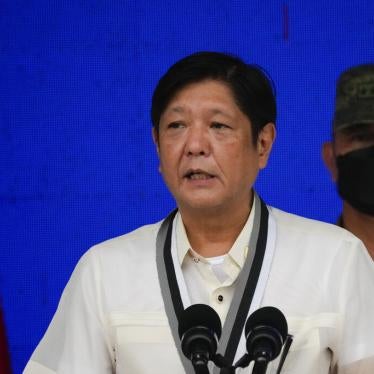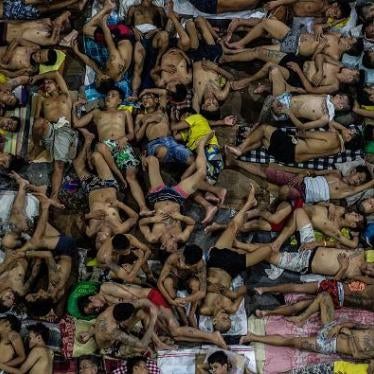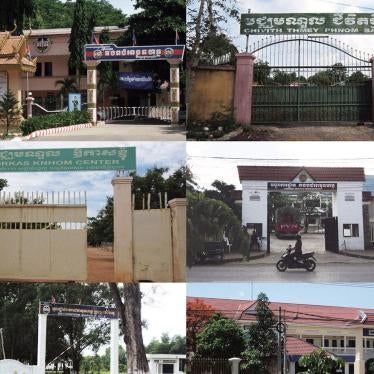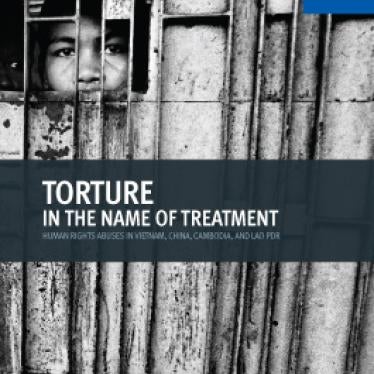Justice A S Anand
The Chairperson National Human Rights Commission (NHRC)
Sardar Patel Bhavan, Sansad Marg
New Delhi 110001
Sub: (Third Amendment to Patents Act 2004)
Dear Justice Anand:
I am writing this letter on behalf of Affordable Medicines and Treatment Campaign (AMTC). The AMTC is a national campaign aimed at creating an environment that will ensure sustained accessibility and affordability of medicines and treatment for every individual in India, including access to affordable Anti-Retroviral Therapy for persons living with HIV/AIDS. It consists of civil society organisations, NGOs, patients groups, healthcare providers and concerned individuals. The campaign was initiated in 2001 with the following mission statement:
The right to life and health is a fundamental right guaranteed to every person living in India and is non-negotiable. This campaign aims to demand and create an environment that will ensure sustained accessibility and affordability of medicines and treatment for every individual in India, including access to affordable Anti-Retroviral Therapy for persons living with HIV/AIDS. This campaign shall be democratic and participatory. It will seek the mobilization of communities and civil society to make state, national and international agencies and industry accountable for securing health for all.
AMTC attempts to encourage action on a wide spectrum of issues relating to the right to treatment. These include WTO negotiations relating to the TRIPS agreement (TRIPS), the impending amendment to Patents Act 1970, law and regulation of drug pricing, national and state level governmental policies relating to health including vertical disease programmes, health needs of the population, transparency and accountability in the pharmaceutical sector, treatment literacy and health care infrastructure etc.
As you are aware the Government of India has initiated to amend the Patents Act 1970 to introduce product patent protection to drug, medicine or food. A Patent Amendment Bill (Bill) was introduced to this effect in the 13th Lok Sabha in December 2003. The Bill lapsed due to the dissolution of Lok Sabha. In the last week of August 2004 the Cabinet has decided to refer the Bill to a Group of Ministers (GOM) to study the implications of contentious issues in the Bill. The GOM consists of Minister of Defense, Minister of Health, Minister of Human Resources Development and Minister of Commerce and Industry. We have learned from news reports that provisions of the referred Bill are identical to the lapsed Bill. This is a matter of concern because the Bill in its present form seriously compromises the accessibility and availability of medicines, two important components of right to health.
Introduction of product patent protection for medicines and agro-chemicals is part of India's obligation under (TRIPS). TRIPS obligates member countries to provide a universal minimum standard of protection for various types intellectual property rights viz. trade mark, copyrights, geographical indications, patents, industrial designs, plant varieties, topography of integrated circuits and trade secrets. India has amended the Patents Act in 1999 and 2002 to comply with the obligations of TRIPS. The only pending obligation with regard to TRIPS is the introduction of product patents to medicines and agro-chemicals. India is to carry out this obligation by, before 1st January 2005.
As you know, the Patents Act 1970 does not provide product patent protection for medicines and food. The Patents Act 1970 was enacted to scrap the Patents Act 1911, which provided product patent protection for medicines and food. The Patents Act 1970 provides only process patent protection to medicines and food. Process patent does not prevent others from making the product per se but prevents others from using the patented process as well as using, offering for sale, selling or importing the product obtained from the patented process. On the other hand, product patent prohibits others from making, using, offering for sale, selling or importing the patented product. As a result the product patent gives a monopoly to the patent owner for the production of patented article during the term of the patent (20 years). Therefore product patent protection for medicines and agro-chemicals creates monopoly and eliminates competition in the pharmaceutical market. Drug companies often abuse the patent monopoly and fix exorbitant prices for the patented medicines. The introduction of product patent thus reduces accessibility and affordability of drugs.
The impact of product patent on the accessibility and availability of drugs are well documented. The most striking incident is the impact of product patent on access to HIV/AIDS drugs. Till 2000, antiretroviral (ARV) drugs were not accessible to the vast majority of people living with HIV/AIDS (PLHA) all over the world because of the high price. Multinational drug companies priced ARV drugs between US$12-13,000 annually per person. The price started falling in 2000 when manufacturers from India introduced generic versions of ARV drugs. Now these generic drugs are given as low as US$ 140 annually per person to certain international organisations like the Clinton Foundation. This is possible because of the absence of a product patent regime in India. Further, the absence of product patent protection has also facilitated the introduction of fixed dose combination (FDC) of ARV drugs. A three-in-one cocktail pill introduced by the generic manufacturers substituted two pills for six pills per day. Thus the FDCs increased the accessibility as well as availability of ARV drugs. The introduction of FDCs became possible only because of the absence of product patent protection in India. The introduction of a product patent regime would prevent generic companies in India from repeating this miracle.
The impact of monopoly on access to medicines is already felt in India. The Controller of Patents has granted an Exclusive Marketing Right (EMR) to Novartis AG, for the drug called Gleevec used for the treatment of patients suffering from Chronic Myeloid Leukaemia (CML), a life threatening form of cancer. EMR is granted as a transitional arrangement before providing product patent protection. Gleevec is sold by Novartis AG at Rs. 1,20,000 per month.. The generic version of the drug was otherwise available to CML patients at Rs 9,000- 12,000 per month. The EMR, if enforced will result in the withdrawal of generic version of Gleevec from the market. Consequently, the overwhelming majority of patients that suffer from CML every year in India will be denied access to this life saving drug. Both the industry and the civil society have approached the Supreme Court of India to challenge the decision of granting EMR on Gleevec.
Thus it shows that introduction of product patent in India will reduce the accessibility and availability of medicines. Therefore, we feel that utmost care is required to introduce the product patent regime. Certain flexibility available under the TRIPS should be used to its full extent to safeguard accessibility and availability of drugs and medicines. The Bill, however, fails to make use of this flexibility at its optimum level. Main criticisms against the bill are as follows.
Firstly, the Bill proposes to extend the scope of patentability beyond the TRIPS requirements by amending Section 3 (d) to allow patent protection for new use of known drugs. Patent for new use would help pharmaceutical companies to extend the monopoly over the drug even after the expiry of original patent. There is no obligation under TRIPS to provide patent protection to new use of known drugs. Earlier, the Mashelkar Committee recommended to limit the patent protection only to new chemical molecules.
Secondly, the Bill proposes to do away with the pre-grant opposition procedure. Currently, there are approximately 6,000 applications pending in the mailbox. In the absence of pre-grant opposition, these 6,000 applications would escape much needed public scrutiny. Public scrutiny is crucial in light of the fact that less than 500 drugs have been granted marketing approvals in India between 1995-2004.
Thirdly, the Bill has not properly incorporated the "August 30th Decision", which permits the grant of compulsory license for export purposes. The Bill proposes to permit compulsory licensing for export purpose if there is a compulsory license in the importing country having no or insufficient manufacturing capacity in the pharmaceutical sector. This ignores the fact that Least Developing Countries (LDCs) need not provide product patent till 2016. In the absence of patent protection, issuance of compulsory license is impossible. In that event, the Indian drug companies would not be able to export to LDCs.
Lastly, the Bill fails to revamp the compulsory licensing mechanism. Even though the Chapter on compulsory licenses in the Patents Act 1970 states the need for protecting the public interest, the same spirit is not reflected in the substantial provisions. Cumbersome procedures without any time line for the final disposal of application makes the compulsory license mechanism an impractical option to curb abuse of patent monopoly.
India as a party to the International Covenant on Economic Social and Cultural Rights (ICESCR) has an international obligation to protect peoples' right to health. According to Article 12 of ICESCR "The States Parties to the present Covenant recognize the right of everyone to the enjoyment of the highest attainable standard of physical and mental health". As you know, accessibility to and availability of drugs are recognized as important components of right to health. The introduction of product patent in the current form will further reduce the access to drugs. The Supreme Court of India recognized the enforceability of right to health within the scope of Article 21 of the Indian Constitution (Vincent Panikurlangara v Union of India 1987 (2) SCC 165). Further, Article 15(1)(b) of the ICESCR recognises "right of everyone to enjoy the benefits of scientific progress and its applications". The Supreme Court often interpreted fundamental rights in consonance with international treaties. Hence, the implementation of product patent should not result in the denial of rights guaranteed under the Constitution of India and the ICESCR. According to Section 2 (d) & (f) of Protection of Human Rights Act, 1993 rights under the ICESCR are the rights that the National Human Rights Commission (NHRC) has to protect.
We therefore request your urgent intervention to safeguard peoples' right to health guaranteed under the Constitution of India and ICESCR by using the mandate under Section 12 (d), (f) and (j) of the Protection of Human Rights Act, 1993. In the context, we request NHRC:
- To seek information from the Government of India regarding the steps which are already taken or under consideration to safeguard the right to health under the product patent regime.
- To study and recommend to the Government of India on the steps to be taken to ensure the enjoyment of benefits of scientific progress and its application, an obligation under Article 15(1) (b) of ICESCR.
- To study and recommend to the Government of India on the options available within the TRIPS Agreement to safeguard right to health.
- To hold a national level consultation with concerned individuals and groups on the implications of intellectual property rights on peoples' right to health.
With warm regards,
For AMTC
Anand Grover
Project Director, Lawyers collective HIV/AIDS Unit
Cc: Justice Y. Bhaskar Rao , Member, NHRC
Cc: Mr. R.S. Kalha, Member, NHRC
Cc: Mr. P.C.Sharma, Member, NHRC
Cc: Mr. Tarlochan Singh, Member, NHRC







